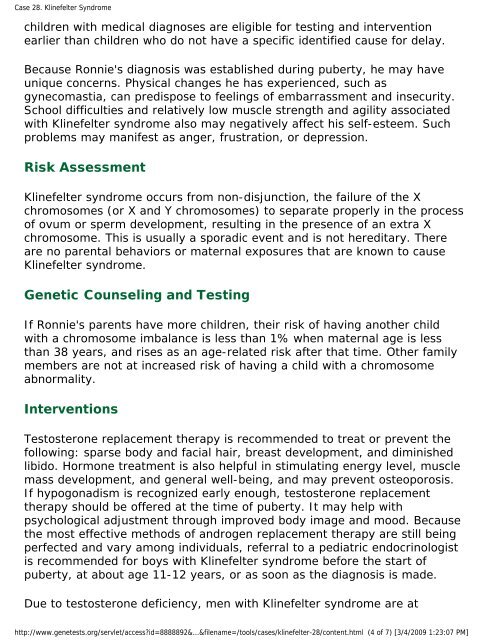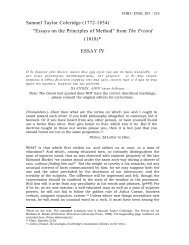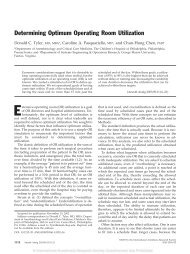Case 28. Klinefelter Syndrome
Case 28. Klinefelter Syndrome
Case 28. Klinefelter Syndrome
Create successful ePaper yourself
Turn your PDF publications into a flip-book with our unique Google optimized e-Paper software.
<strong>Case</strong> <strong>28.</strong> <strong>Klinefelter</strong> <strong>Syndrome</strong><br />
children with medical diagnoses are eligible for testing and intervention<br />
earlier than children who do not have a specific identified cause for delay.<br />
Because Ronnie's diagnosis was established during puberty, he may have<br />
unique concerns. Physical changes he has experienced, such as<br />
gynecomastia, can predispose to feelings of embarrassment and insecurity.<br />
School difficulties and relatively low muscle strength and agility associated<br />
with <strong>Klinefelter</strong> syndrome also may negatively affect his self-esteem. Such<br />
problems may manifest as anger, frustration, or depression.<br />
Risk Assessment<br />
<strong>Klinefelter</strong> syndrome occurs from non-disjunction, the failure of the X<br />
chromosomes (or X and Y chromosomes) to separate properly in the process<br />
of ovum or sperm development, resulting in the presence of an extra X<br />
chromosome. This is usually a sporadic event and is not hereditary. There<br />
are no parental behaviors or maternal exposures that are known to cause<br />
<strong>Klinefelter</strong> syndrome.<br />
Genetic Counseling and Testing<br />
If Ronnie's parents have more children, their risk of having another child<br />
with a chromosome imbalance is less than 1% when maternal age is less<br />
than 38 years, and rises as an age-related risk after that time. Other family<br />
members are not at increased risk of having a child with a chromosome<br />
abnormality.<br />
Interventions<br />
Testosterone replacement therapy is recommended to treat or prevent the<br />
following: sparse body and facial hair, breast development, and diminished<br />
libido. Hormone treatment is also helpful in stimulating energy level, muscle<br />
mass development, and general well-being, and may prevent osteoporosis.<br />
If hypogonadism is recognized early enough, testosterone replacement<br />
therapy should be offered at the time of puberty. It may help with<br />
psychological adjustment through improved body image and mood. Because<br />
the most effective methods of androgen replacement therapy are still being<br />
perfected and vary among individuals, referral to a pediatric endocrinologist<br />
is recommended for boys with <strong>Klinefelter</strong> syndrome before the start of<br />
puberty, at about age 11-12 years, or as soon as the diagnosis is made.<br />
Due to testosterone deficiency, men with <strong>Klinefelter</strong> syndrome are at<br />
http://www.genetests.org/servlet/access?id=8888892&...&filename=/tools/cases/klinefelter-28/content.html (4 of 7) [3/4/2009 1:23:07 PM]
















